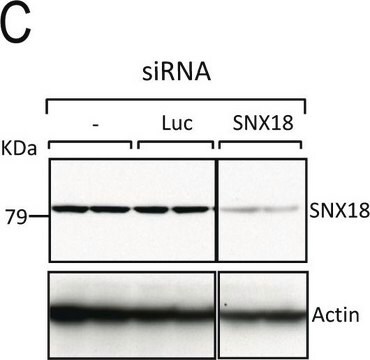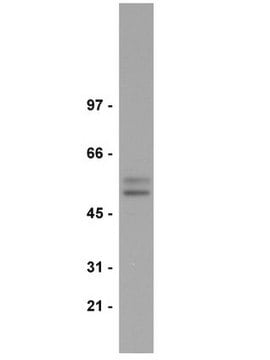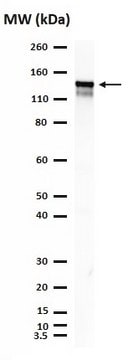M7683
Anti-phospho-MAP Kinase Kinase 1/2 (pSer217/221) antibody produced in rabbit
affinity isolated antibody, buffered aqueous glycerol solution
Synonyme(s) :
Anti-phospho-MEK 1/2 (pSer217/221)
About This Item
Produits recommandés
Source biologique
rabbit
Niveau de qualité
Conjugué
unconjugated
Forme d'anticorps
affinity isolated antibody
Type de produit anticorps
primary antibodies
Clone
polyclonal
Forme
buffered aqueous glycerol solution
Poids mol.
antigen 45 kDa
Espèces réactives
human, rat, mouse
Technique(s)
flow cytometry: 1:50 using PMA treated human peripheral blood lymphocytes and Jurkat cells.
immunocytochemistry: 1:1,000 using HeLa cells
immunohistochemistry (formalin-fixed, paraffin-embedded sections): 1:100 using tissue sections from human breast carcinoma
immunoprecipitation (IP): 1:50
western blot: 1:1,000 using serum-treated NIH-3T3 cells
Numéro d'accès UniProt
Conditions d'expédition
wet ice
Température de stockage
−20°C
Modification post-traductionnelle de la cible
phosphorylation (pSer217/pSer221)
Informations sur le gène
human ... MAPK1(5594)
mouse ... Mapk1(26413)
rat ... Mapk1(116590)
Description générale
The antibody specifically recognizes MEK1/2 (45 kDa) only when phosphorylated at Ser217 and Ser221. It reacts strongly with MEK1/2 phosphorylated only at Ser217, but less when phosphorylated only at Ser221. It shows not cross reaction with any other related family members including SEK.
Spécificité
Immunogène
Application
Forme physique
Clause de non-responsabilité
Vous ne trouvez pas le bon produit ?
Essayez notre Outil de sélection de produits.
Code de la classe de stockage
10 - Combustible liquids
Point d'éclair (°F)
Not applicable
Point d'éclair (°C)
Not applicable
Certificats d'analyse (COA)
Recherchez un Certificats d'analyse (COA) en saisissant le numéro de lot du produit. Les numéros de lot figurent sur l'étiquette du produit après les mots "Lot" ou "Batch".
Déjà en possession de ce produit ?
Retrouvez la documentation relative aux produits que vous avez récemment achetés dans la Bibliothèque de documents.
Notre équipe de scientifiques dispose d'une expérience dans tous les secteurs de la recherche, notamment en sciences de la vie, science des matériaux, synthèse chimique, chromatographie, analyse et dans de nombreux autres domaines..
Contacter notre Service technique








